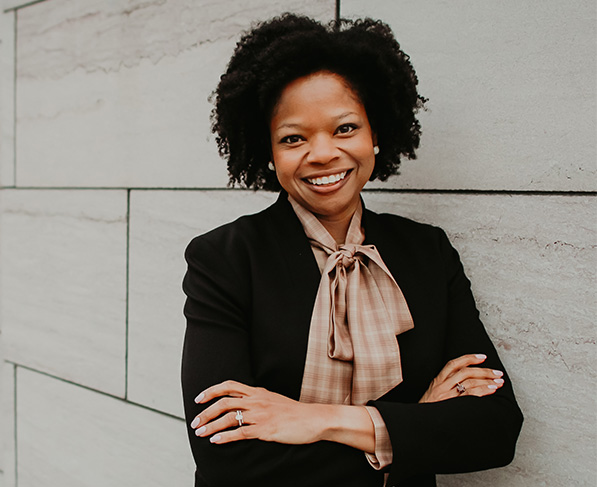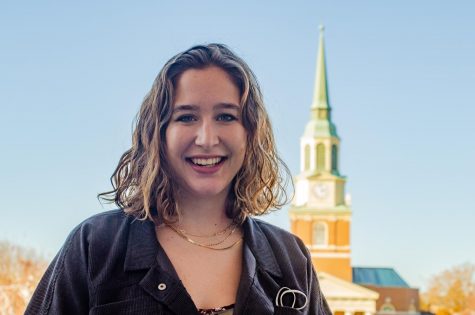Deacon Profile: Dr. Shea Kidd-Brown
January 20, 2022
Dr. Shea Kidd Brown is the recently-appointed vice president for Campus Life, the administrative division which includes Campus Recreation, Residence Life and Housing, Campus Police, and several other programs. After serving as the associate vice chancellor for student life and dean of students at the University of Tennessee, Knoxville, Brown began working for Wake Forest at the beginning of January 2022. In the words of President Susan Wente, Brown “has a gift for connecting in meaningful ways with students and campus partners and is committed to ensuring all students can feel a sense of belonging and thrive here.”
What inspired you to start working in higher education?
I think it started back when I was an undergrad, but I didn’t know it yet. I was really enthusiastic about the campus experience, and I think it was because I didn’t necessarily arrive at college super confident and benefitted greatly from people who saw things in me that I didn’t see myself. After undergrad, I had a very short stint in sales, then called my mentor, the Vice President for Student Affairs at my undergraduate University, and shared that I wasn’t fulfilled. I had thought about student affairs as a profession, but I really never pursued it, and it was then that he encouraged me to think about that again. In retrospect, there were people all along the way who were modeling who I wanted to be. It was really the impact that those individuals had on me during my four years of undergraduate that propelled me into this career.
What led you to accept this position at Wake Forest?
When this opportunity emerged it seemed like something I wanted to learn more about because of the reputation that precedes Wake Forest. There’s such a rich history of how this university operates and the students that it attracts. Based on my career portfolio I thought I could really meld the things that I had learned so far in my career with this position. Through the inter
way for students to form relationships, just like I did with my mentor. I met him on the steps of the student center; he asked me my name and my story. And years and years later, even today, he’s someone that I consider a mentor and think about. So I think campus life really helps students to find their identity and find their leadership identity. Leadership doesn’t have to be situated in a position formally, but it really is this constant desire to wake up and be a better person today than we were yesterday.
What is your vision for Campus Life?
I really approach a new position as one where we are all teachers and all students, so a big part of my job is to learn about Wake Forest and to forge deep relationships with faculty and staff, alumni, family members and students. I think that will help form the vision as I see what’s working and what’s not working.
I also think that part of my transition process is creating more formalized communication opportunities, so President Wente and I are creating a roundtable discussion where we’ll work with various student groups and literally invite students to the table. Another area that will inform my vision is really thinking about the campus experience from a perspective of different strengths. There are certainly challenges, but I tend to look at what’s going on right here and how we can take this small phenomenon and then scale it more broadly.
What are some of these strengths, and what are some challenges that you may anticipate this semester and throughout your tenure?
Wake Forest is known nationally for its work around well-being; there are a number of resources available on campus, not just one place that students can go. Also, the teacher-scholar ideal is something that really attracted me here. Other strengths are the academic reputation: our students are very bright and come from a lot of different pockets. From an opportunities perspective, I believe that students want more open opportunities to talk with administrators about their experiences and to be able to communicate with administrators not only when something’s going wrong. So I think being able to create a huge opportunity for us is to create those forms, just like you know, the roundtable discussions that we will begin. I think there were some challenging conversations that took place in the fall, so we are now able to come back to those and think about what we learned from that.
Is there anything you would like students to know about you?
I want to be an approachable, accessible leader and so I welcome and invite the hellos and I invite students to make an appointment; if they want to connect with me one-to-one, I’m certainly open to that. I’m also very active on social media so students can follow me on Twitter and Instagram. I think lastly we all have a story, and our story has meaning and purpose so I’m excited to be a part of helping students make those connections along the way, as they’re figuring out who they want to be and what their identities are, and where they’ll go from here.
Editor’s Note: This interview has been edited for brevity and clarity.















